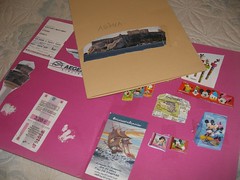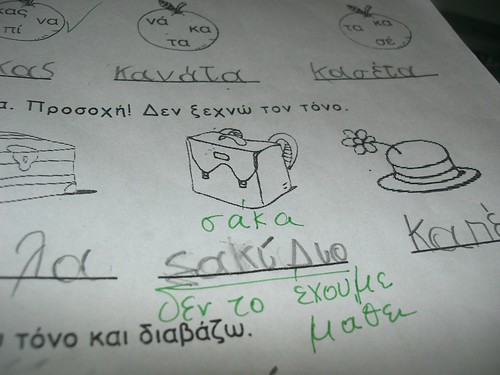We have a lot of books lying around the house for the children to browse through and pick an activity they'd like to try. They've made volcanoes erupt (using vinegar and baking soda), they've made an aquarium (in a shoe box; the fish are hanging on strings) and they've made lap books (thanks to Paula, a home schooling teacher in the US, who likes to blog about food, which is how I discovered her) . But they still need help to do all these things, and even more so in the kitchen, where they're 'playing' with knives and heat. On a recent rainy weekend, my children asked me to let them make some biscuits that they saw in a DK activity book.
The instructions in the book were quite simple, and there was also a page full of different biscuit designs that they could try. They particularly liked the coloured biscuits, which of course they wouldn't be able to re-create since we don't keep this kind of confectionery in our house. I explained to them that I would help them to make the dough, but they could make all the biscuits. I disappeared from the kitchen (I felt like a homeless person) to let them work independently.
I heard an argument start between the children. Aristotle was annoyed that Chrstine wasn't lining up the finished biscuits in a similar pattern on the baking tray: Aristotle was angry because "she's not making a motivo." His view of the world is an ordered one where everything has to be done one step at a time, following some logical pattern. He wanted to see a motif on the baking tray. Needless to say, he is stuck on doing one activity before moving on to another activity: it is common knowledge that men can only do one task at a time, while women perform multi-tasking (something to do with women possessing a larger corpus callossum in the brain).

(if you want to make the biscuits - the recipe is simple and the children had lots of fun making them - the recipe is given in the photo from the book)
Christine, in the meantime, was looking at the biscuit designs in the book and trying to copy them. She did her best, but was annoyed that she wasn't able to make her biscuits look exactly the same as the illustrations. "Why don't you make up some of your own designs?" I asked her. She stared at me blankly, as if she did not understand what I meant. Her brother, on the other hand, understood exactly what I meant; "That's not what the book says," he answered. If it's not in the book, it can't be done; if the teacher (in this case, the book) didn't say it should be done, then it shouldn't be done. It was very hard to convince the children that they could shape and top the biscuits any way they wanted.
Similarly with school homework, "δεν το είπε η κυρία" (den to ipe i kiria - the teacher didn't tell us to do that) is often what a Greek child will tell its parents if they suggest deviating in any way from the teacher's instructions. Going against the exact orders of the teacher, even if s/he expalined something incorrectly, is a sacrilege; the teacher is always right, even if s/he is wrong.
All over the world, the education system is the same: the most important things a child must learn at school are the three R's (Reading, w-Riting and a-Rithmetic), while anything creative gets second (or no) place. Science subjects are treated with reverence, but even they do not get the respect they are due, because if you can't think creatively, you can't really be a scientist, and there is so much to discover that is still unknown in the world, but children in Greece (and, I suspect, in most parts of the world) are learning what is already known, what is in the set textbooks of their education system and libraries, all in the aim of turning children into miniature self-important professors, despite the fact that in this world, we also need plumbers, laboratory technicians and rubbish collectors to make it go round.
Here's an example from my first-grade daughter's homework (yes, she really does have homework at age 6). Every day, the teacher (a lovely young woman with some teaching experience) gives the children a typed (or sometimes hand-written) sheet of language exercises. There is usually a letter-identifying exercise (eg "circle all the K's and k's"), a find-the-correct-spelling task (a given word must be found in a word cloud) and a picture exercise where children write down the word they see in the illustration.
Christine generally has no problem doing any of these activities. Upon seeing a paintbrush, she wrote pinelo (πινέλο), she recognised the cat - gata (γάτα) - and she recognised the bag: the general word for 'bag' in Greek is tsanta (τσάντα). But she didn't know how to spell 'tsanta'; the 'ts' and 'nt' letter combinations are difficult to recognise for a young child who has only recently started learning to read in Greek. I 'knew' that the teacher wasn't expecting Christine to write the word 'tsanta' on the line underneath the bag picture; I had previous experience of the same photocopied material (would you believe it, teachers aren't even writing their own student handouts?) from my son's homework, exactly one year ago.
"'Tsanta'. How do you write 'tsanta', Mum?" asked Christine.
On an informative note, the Greek language is not difficult to read once the letters and basic spelling rules are learnt, which is why, by Christmas, most first-grade Greek children can read practically any printed matter in the Greek language. (This can not happen for the English language where each letter or pair of letters does not have a standard pronunciation pattern: just think about how the words 'though', 'rough', 'through' and 'thought' are pronounced.) As a teacher myself, I don't believe in spoon-feeding children, not just my own. I tried to get her to think creatively so that she would do the exercise herself.
"Well, if you can't write the word 'tsanta', can you think of another word for 'tsanta'?"
Christine thought about it for a while. "'Sakidio?'" she offered. Σακίδιο is a kind of backpack, similar to a school bag.
"OK," I replied, knowing that I should have made a more exclamatory remark like 'bravo!' or 'excellent!' to encourage her ability to think for herself; what held me back was that, once again, I 'knew' that this was not the answer that the teacher was expecting. I had seen all this before. Sure enough, the next day, the red ink (in this case, purple) was sprawled all over the bag icon: the 'correct' word was 'σάκα' (saka - an old-fashioned word for school bag, which no one uses nowadays, as it is reminiscent of 'satchel') and the teacher underlined the fact that the word 'sakidio' contains a combination of letters (the two vowels at the end) which 'have not yet been taught'. Why she couldn't just tick it as correct, and write 'saka' as a synonym rather than a correction, I do not wish to go into. It reminds me of teachers who can only go into a lesson carrying an answer book to the pupils' textbooks. What upsets me most is that she expected a six-year-old child to work through a homework sheet according to what had been taught in the class, without the child bringing in her own experiences.
I accidentally came across a brilliant mp3 - the only one I have ever heard, come to think of it. As I was perusing Jeremy's Wellington blog (where I was born), I noticed a side link in his favorite blogs that sounded vaguely familiar "Creativity Killer of Kids: our Education System." I had to check it out, and that's where I discovered Sir Ken Robinson. Please listen to his lecture; you may think he's trying to sound funny, but that's only because he is trying to attract your attention, as he has a serious point to make - I do this all the time with my adult students. He believes that creativity is as important as literacy in the education of children, and it should be given equal status; but the education systems of most countries of the world are "educating children out of creativity": they are teaching them not to make mistakes, and if you don't make mistakes, you will never be creative.
*** *** ***
"Mum, we've finished," the children called out from the kitchen. There was no more space on the baking tray, but there was some dough left in colours (yellow and chocolate).
"I'm going to make some biscuits, too," I told the children.
"Which pattern are you going to choose?" asked my son.
"None of those ones," I replied. "I'm going to make up a design of my own."
"How?" He was bewildered.
"Just watch me," I said. I rolled each leftover bit of dough into two long strands and stacked them one on top of each other in alternate colours. Then I rolled the new dough combination altogether to get the strands to adhere to one another. Finally, I cut the sausage shape into slices: checkered biscuits.
"Wow," they both exclaimed.
"You don't have to make these ones," I warned them. "Think up something for yourself."
Sir Ken finishes off his lecture with the following statement: "We may not see our children's future, but they will, and our job is to make something of it." He also quotes another well-known writer who has this to say about the human being's actions against creativity: "If all insects disappeared from the Earth, in 50 years time, there would be no life; but if all people disappeared from Earth, in 50 years time life would flourish."
©All Rights Reserved/Organically cooked. No part of this blog may be reproduced and/or copied by any means without prior consent from Maria Verivaki.





That's really interesting!
ReplyDeleteWait to see the education system when your children go to high school! Test, test and...test every single day!!!And more important without KNOWLEDGE! Just boring teachers without any interest for their job or the kids!
ReplyDeleteAnd you're so right about the dead 15 years old boy!
"Δεν το έχουμε μάθει"
ReplyDeleteThis answer is worth billions!!!!
You know, sometimes i look back and i am wondering how did we ever make it out of this kind of schools...
The kind of stories i have lived through all my education so far are hair rising by the standards i found when i came to the UK.
When i came to the UK i could not stop but asking myself...Why do these kids that have everything (a good library, modern computers, excellent and clean buildings, positive lecturers, opportunities for a range of activities supported by the Uni) why do they behave like that? Why don't they take advantage of it? The uni has more international students than locals. Of course, locals thrive as well....this environment let's you think that if you set your mind to it, you can progress...
It was like some kind of shock...Everything was so organised and pieceful that i was looking around trying to find the cameras....is someone pulling a joke on me?
I came here from Hyde Daily Photo because I noticed your an ex-pat kiwi. I'm still in NZ, not ex-pat like you. I have just read this post with great interest, havn't read the others yet:) I will be back again soon.
ReplyDelete